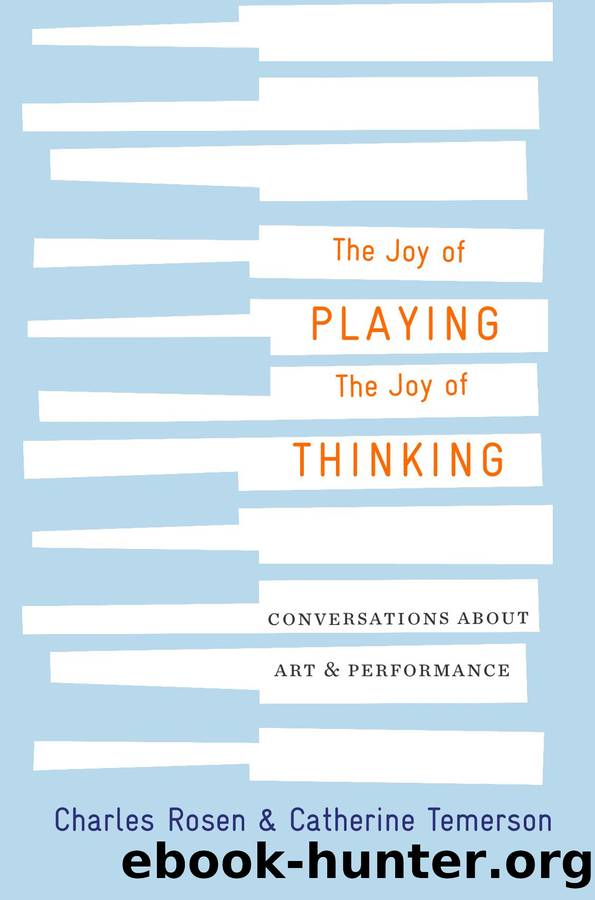The Joy of Playing, the Joy of Thinking by Unknown

Author:Unknown
Language: eng
Format: epub
Publisher: Harvard University Press
4
Performance
CATHERINE TEMERSON: Criticism should adopt the point of view of the composer. Shouldnât the performer do the same?
CHARLES ROSEN: You raise a problem there that greatly preoccupies me, that of fidelity to the score. The answer is not obvious: the interpreter can show himself perfectly faithful, play all the notes exactly, and give a bad performance. Inversely, he can introduce a few changes to the score and produce an interpretation that is entirely faithful to the composerâs ideas. My ideal is performers who show imagination while rigorously respecting the score. Musicians who change the tempos, the dynamics, the accents, the phrasing, may get interesting results sometimes, but all too easily. It is much more difficult to keep, as Schnabel and Solomon do, to the composerâs tempos, dynamics, and phrasing, while giving the impression that you are improvising, creating the work as you play.
In any case, as Schnabel said, there is no definitive performance: a Beethoven sonata will always be superior to any performance of it. There are several ways to adhere to the score: they lead to completely different interpretations.
It is, in fact, the tension that exists between text and execution that is interesting; it disappears when the performer strays too far from the score. The whole difficulty is there: how to manage to play in a very personal, very inventive way, but adhere completely to the text.
The notion of fidelity is related to the myth of authenticity: Should the performer envisage a piece of music as an independent structure, outside of any historical context, or should he attempt to recreate the interpretation of the period when the music was written? This is a dilemma that animates a lively polemic today.
CATHERINE TEMERSON: Where do you stand in this polemic?
CHARLES ROSEN: Unfortunately, I fall between the two opposing camps. I think it is important to have historical knowledge, to be able to situate the composer in his epoch, to know the instruments of his time, and the performer ought to draw on that knowledge in his playing. Music has always been made for diverse interpretations. In the eighteenth century, there were French ways and German ways of playing. That is no reason to find a French performance of a work by Bach unacceptable! Later, we know that Brahms was perfectly content to hear his symphonies conducted by French conductors. It has been said that this or that aria in an opera by Handel was composed for this soprano or that tenor, but there were always replacement singers who made it possible to hear the same aria, sung differently. It completely falsifies the function of music to pretend that only a single historical interpretation exists, immutable and definitive.
CATHERINE TEMERSON: Is it possible to know exactly how pieces were played in the past?
CHARLES ROSEN: We know more or less precisely how they were played in the eighteenth and nineteenth centuries. We have recordings beginning in the twentieth century. But recordings donât change anything. When we listen to recordings of modern music made in
Download
This site does not store any files on its server. We only index and link to content provided by other sites. Please contact the content providers to delete copyright contents if any and email us, we'll remove relevant links or contents immediately.
Four Thousand Weeks by Oliver Burkeman(1840)
What Happened to You? by Oprah Winfrey(1764)
Karma by Sadhguru(1603)
This Changes Everything by Unknown(1499)
You Are a Badass: How to Stop Doubting Your Greatness and Start Living an Awesome Life by Jen Sincero(1172)
Don't Sweat the Small Stuff...and It's All Small Stuff by Richard Carlson(1114)
Infinite Circle by Bernie Glassman(1046)
How to Do the Work by Dr. Nicole LePera(1004)
Let's Talk About Hard Things by Anna Sale(985)
Declutter Your Mind: A step by step guide to learn to control your thoughts, stop worrying, relieve anxiety and eliminate panic attacks and negative thinking by Mia Chandler(961)
Who Moved My Cheese? by Spencer Johnson(948)
The 4-Hour Workweek by Timothy Ferris(946)
Real Strength: Build Your Resilience and Bounce Back From Anything by Psychologies Magazine(934)
The Path of Greatness--The Game of Life and How to Play It and Other Essential Works by Florence Scovel Shinn(915)
Breakup Bootcamp by Amy Chan(892)
Be Your Best Self by Mike Bayer(885)
Curative Magic by Rachel Patterson(875)
The Book of Hope by Jane Goodall(867)
Advice for Working Moms (HBR Working Parents Series) by unknow(861)
